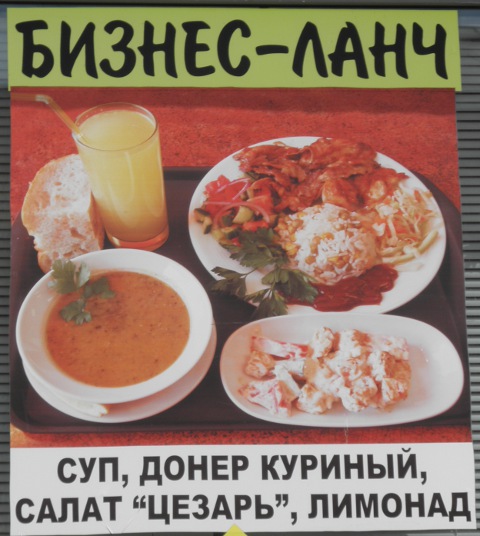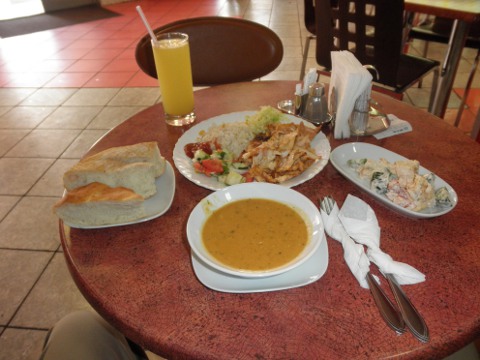Бизнес-ланч
As weird as this sounds, sometimes it's the English words in Russian that confuse me, not the Russian words. For instance, all over Kazan these days there are signs on restaurants that read Бизнес-ланч "Business Lunch." "What the heck is that?" I ask the locals. They look at me as if I am an idiot and say, "Those are English words. You should understand them." Well that's just it. I do understand them. In the US a business lunch is a lunch where you do business. It's not the name of an item on a menu.¹
Nowadays in Russia a бизнес-ланч is essentially a particular menu offered at a fixed price. No substitutions, please. I think the best translation for it may be "lunch special" or what some menus lable a prix fixe meal. One of the many restaurants in Kazan that offer such meals is called "Meat House."
My students love this place because you can get meat without mayonaisse or sour cream on it. What? No mayo or sour cream, you say? It can't be run by Russians then. You are correct: the food is prepared by Turks. I was interested in the meal represented on this ad:

They offered it for 149 rubles, which is about 5 bucks. I decided to try it. How well did it match the advertisment? You be the judge:

The drink is lemonade. The lentil soup could have used a bit more salt. The bread was good, but I'm not a fan of bread. The donair (Canadian spelling) is finely shaved chicken accompanied by rice and some cabbage, and the salad is made half of croutons and half of vegetables tossed in what the Russians consider a Caesar sauce, but it doesn't have the sardine flavor that an American Caesar Salad requires. Here are some sample sentence:
| — В кафе «Нептун» предлагают вкусный бизнес-ланч с морепродуктами. Не пойдёшь со мной? — Нет, я не люблю рыбу. |
"At the Neptune Cafe they offer а delicious seafood lunch special. Do you want to go with me?" "No, I don't like fish." |
| — Какой у вас сегодня бизнес-ланч? — С курицей или с мясом. |
"What's your lunch special today?" "You can have chicken or meat." |
| — Почему вы не принесли мне суп? — В нашем бизнес-ланче нет супа. — Да что вы. Бизнес-ланчей без супа не бывает. — А у нас бывает. Посмотрите на рекламу. Там нет никакого супа. |
"Why didn't you bring me soup?"' "Our lunch special doesn't have soup." "Oh, come on. There's no such thing as lunch specials that don't have soup." "There is here. Look at the ad. There isn't any mention of soup." |
| В кафе «Мит Хаус» очень вкусные блюда. Я часто туда хожу за бизнес-ланчем. | "Meat House" has really delicious food. I often go there for the lunch special. |
Business lunches, in the sense of lunches where you do business, are vital in the US. When I was preparing this blog-entry, I came across a business-lunch link from Microsoft. Apparently they consider it important enough to give some basic guideliness for the event. Read it here for your amusment.
One last grammatical comment: бизнес-ланч is a phrase that is currently in a grammatical no-man's land. Although most people decline it, as a foreign phrase it is sometimes not declined by others. The orthographic dictionary at gramota.ru treats it as declineable, so that's the best approach for a foreigner to use. In the case of the examples above, one of my current native-speaker informants sometimes declined it and sometimes didn't. If it disappoints you that the Russian language is sometimes inconsistent, then you must take advice from about 2 minutes 5 seconds into the sword fight in The Princess Bride: "Get used to disappointment."
¹ Well, this not necessarily 100% true. Probably there are some restaurants somewhere in the US that have "business lunch" written on their menu. My point here is that "business lunch" in the sense of a particular meal selection for a particular price is not a standard phrase in American English.
3 comments
Well, I’m pretty sure I’ve _never_ seen the “prix fixe” expression on any French language menu in any French restaurant. And I’ve checked again between my first comment and this latest one in maybe 10 restaurants… Are you sure it wasn’t on an English translation for tourists ?
In French, “menu” itself means that the “price is fixed". The opposite is “à la carte".
But nevermind, the goal is not to argue about French but to learn new interesting words in Russian, and your blog is very useful for that purpose ! Thanks again…
Don responds: Manu, thanks for your note. I’m happy to know that it’s not a current phrase. I remember the first menu on which I saw the phrase “prix fixe". It was definitely a French language menu, but it was in a part of Paris where tourists were likely to be, so it is entirely possible that the phrase was there for the purposes of dealing with tourists. Warmest wishes, Don.
Well, in French, we never talk about “prix fixe” menu. “Prix fixe” is used in English as Бизнес-ланч is used in Russian : the words are French, but not the expression…
Don responds: Manu, thanks for you comment. To tell the truth, I’m not sure how to evaluate it. I visited Paris in 1991. At that time restaurants customarily had their daily special posted on the wall outside the restaurant, and that menu usually included the phrase ‘prix fixe.’ Granted, in spoken language perhaps people might call that meal something like ‘le plat du jour,’ but the menu always was clearly marked ‘prix fixe.’
Using “бизнес-ланч” as indeclinable nouns would be highly unnatural for me, so I would treat it in the same manner as other similar nouns (ланч, мяч, грач, врач and so on).
It is not that I actually use the word in my life, but I noticed that nouns for objects with “zero-ending” from other languages pose little problem for Russian language. People just treat them as masculine nouns of the corresponding declension. In my speech I do it automatically for interface items and professinal slang (I work as a 3D artist)
Don responds: Shady, thanks as always for your comments. I have to agree. When I first wrote this post, I declined all the forms. Then my current native-informant shocked me by not declining some of them. As a rule of thumb, I always let native speakers guide me, although after nearly 30 years of studying Russian I sometimes don’t accept that advice at face value. On this occasion my informant was a young man in college in Kazan. He is a native Russian (no Tatar blood), so I assumed I could trust his instinct here. The trick is this: he is a college student on a generic money saving budget. That means he doesn’t purchase ‘business lunches’ or frequent establishments that have them. Thus he lacks the day-to-day experience of the phrase. When I chatted with two other local friends, who are in financially better positions than my current informant, they confirmed declining it all the time. Such is life. Even native speakers can mislead you about things outside their experience. I have now returned all those sentences to fully declined forms.
Form is loading...